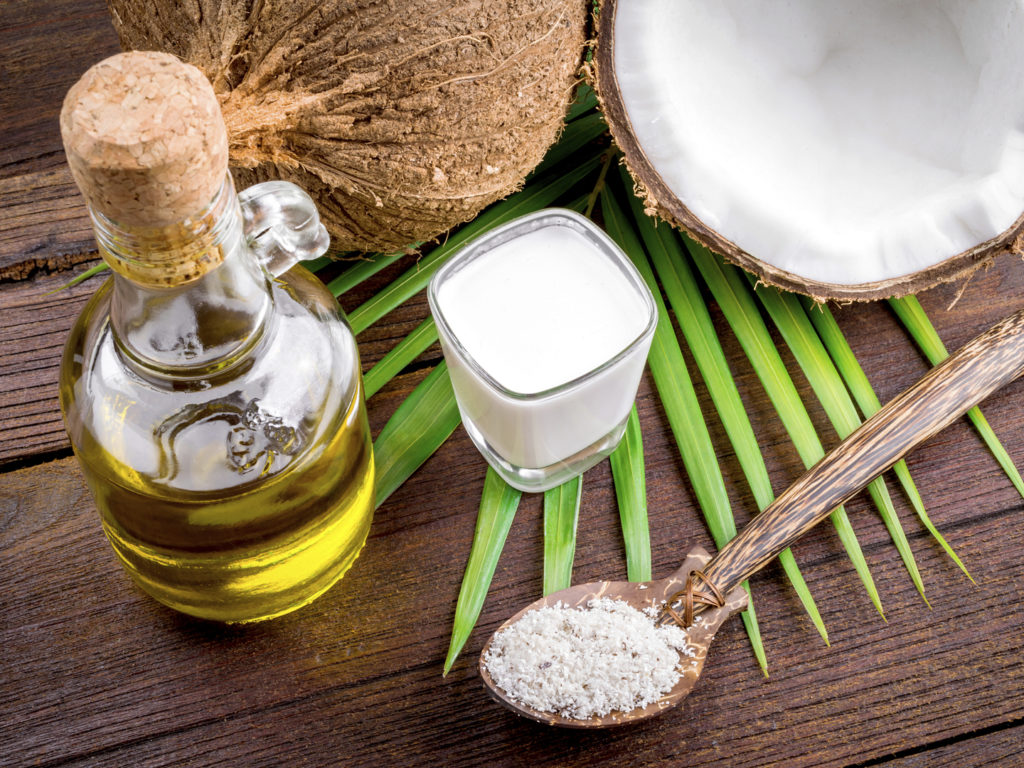
Coconut oil is incredibly popular — and for good reason. It offers many health benefits, has a delicate taste, and is widely available. It’s also an extremely versatile oil with a number of uses you may not be aware of.
Here are 29 clever uses for coconut oil.
1. Protect Your Skin From UV Rays
When applied to your skin, coconut oil may protect it from the sun’s ultraviolet (UV) rays, which raise your risk of skin cancer and cause wrinkling and brown spots. In fact, one study found that coconut oil blocks about 20% of the sun’s UV rays (1). However, keep in mind that it doesn’t provide the same protection as conventional sunscreen, which blocks about 90% of UV rays. Another study estimated that coconut oil has a sun protection factor (SPF) of 7, which is still lower than the minimum recommendation in some countries (2).

2. Increase Your Metabolism
Coconut oil contains medium-chain triglycerides (MCTs). These are fatty acids that are quickly absorbed and can increase the number of calories you burn (3).Controlled studies have shown that MCTs can significantly boost your metabolic rate — at least temporarily (4, 5). One study found that 15–30 grams of MCTs increased the number of calories burned by an average of 120 over a 24-hour period (6).
3. Cook Safely at High Temperatures
Coconut oil has a very high saturated fat content. In fact, about 87% of its fat is saturated (7). This feature makes it one of the best fats for high-heat cooking, including frying. Saturated fats retain their structure when heated to high temperatures, unlike the polyunsaturated fatty acids found in vegetable oils. Oils such as corn and safflower are converted into toxic compounds when heated. These may have harmful effects on health (8). Therefore, coconut oil is a safer alternative for cooking at high temperatures.

4. Improve Your Dental Health
Coconut oil can be a powerful weapon against bacteria, including Streptococcus mutans, the bacteria in your mouth that causes dental plaque, tooth decay, and gum disease. In one study, swishing with coconut oil for 10 minutes — known as oil pulling — reduced these bacteria as effectively as rinsing with an antiseptic mouthwash (9). In another study, swishing daily with coconut oil significantly reduced inflammation and plaque in teenagers with gingivitis (inflamed gums) (10).

5. Relieve Skin Irritation and Eczema
Research shows that coconut oil improves dermatitis and other skin disorders at least as well as mineral oil and other conventional moisturizers (11, 12, 13). In a study in children with eczema, 47% of those treated with coconut oil noticed major improvements (13).
Research shows that coconut oil improves dermatitis and other skin disorders at least as well as mineral oil and other conventional moisturizers (11, 12, 13). In a study in children with eczema, 47% of those treated with coconut oil noticed major improvements (13).
6. Improve Brain Function
The MCTs in coconut oil are broken down by your liver and turned into ketones, which can act as an alternative energy source for your brain (14). Several studies have found MCTs to have impressive benefits for brain disorders, including epilepsy and Alzheimer’s (15, 16, 17). Some researchers recommend using coconut oil as a source of MCTs to increase the production of ketones (14).

7. Make Healthy Mayonnaise
Commercial mayonnaise often contains soybean oil and added sugar.However, it’s easy to make your own mayo with coconut oil or olive oil. The second recipe on this list uses coconut oil as one of the fats for a healthy homemade mayonnaise.
8. Moisturize Your Skin
Coconut oil makes a wonderful moisturizer for your legs, arms, and elbows. You can use it on your face as well — though this isn’t recommended for those with very oily skin.It can also help repair cracked heels. Simply apply a thin coat to your heels at bedtime, put on socks, and continue on a nightly basis until your heels are smooth.
9. May Help Fight Infections
Virgin coconut oil has antibacterial properties that can help treat infections. One test-tube study found that it stopped the growth of the intestinal bacteria Clostridium difficile, commonly known as C. diff, which causes severe diarrhea (18). It also appears to fight yeasts — an effect generally attributed to lauric acid, the main fatty acid in coconut oil (19). However, no studies have proven that coconut oil is effective at treating infections when eaten or applied to the skin.
10. Increase Your ‘Good’ HDL Cholesterol
Coconut oil has been shown to raise cholesterol levels in some people. However, its strongest and most consistent effect is an increase in “good” HDL cholesterol (20, 21, 22). One study in women with abdominal obesity found that HDL increased in a group consuming coconut oil, whereas it decreased in those consuming soybean oil (22).
 See all
See all
Comments